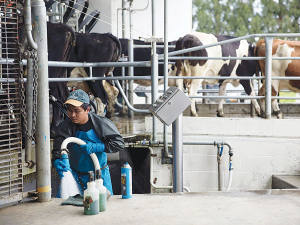Farmers welcome the state approval of 500 extra overseas workers but warn that it's not a silver bullet for the sector's labour woes.
Federated Farmers immigration spokesman Chris Lewis told Dairy News that he welcomes the government move.
But while it's good news and will help in the coming season, Lewis warns that getting labour from overseas is not the solution.
He says for farmers, recruiting staff from overseas is not the first cab off the rank. He points to the time and cost of recruiting staff from overseas.
"There is a lot of paperwork back and forth to get staff from overseas and it can take between four and six weeks for Filipinos to get a medical in their country," he told Dairy News.
"It's the same in a lot of other countries, including NZ. You may spend between $70k and $80k to get a worker. For many farmers it's the route of desperation," he says.
Lewis says the other challenge in recruiting Filipino workers is the attractive options across the ditch in Australia. He points to the fact that many of the wives and partners of Filipino workers are employed in the healthcare sector. He says the Australian healthcare sector offers considerably better pay than NZ and this can influence a worker's decision about which country to work in. Lewis adds that Australia has also provided more in the way of subsidies to farmers to recruit overseas workers than NZ has.
While the cash may be better in Australia, Lewis points out the actual working conditions on farms in NZ are better. He says the country needs to do more to highlight this.
"For a start, NZ is recognised as offering better training on farm than Australia. We offer accommodation on our farms, whereas in Australia if you work on a farm you may have to live in a town and travel to the farm because they don't provide housing. The NZ climate and the absence of snakes and spiders is also seen as an advantage," he says.
Overall, Lewis acknowledges there is problem recruiting staff to work on NZ dairy farms. He points to the example of demand for labour in the construction industry. But he says farmers have made huge strides in making work on dairy farms here more attractive. Cheap rent and better and more reasonable working hours are part of the changes made.
He says one of the barometers for determining the worker shortage is to follow the job adverts for workers on Farm Source and Trade Me. He says two or three years ago there were between 400 to 600 jobs for dairy workers advertised.
"Now it's around 1,200," he says.











